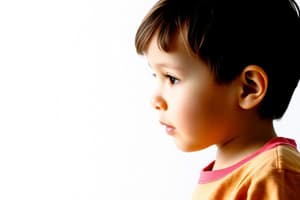Podcast
Questions and Answers
What is the gestation period for human development?
What is the gestation period for human development?
- 38-40 weeks (correct)
- 40-42 weeks
- 36-38 weeks
- 30-32 weeks
What is the term for the forming of synapses between neurons that continues until about 2 years old?
What is the term for the forming of synapses between neurons that continues until about 2 years old?
- Synaptogenesis (correct)
- Neural pruning
- Myelination
- Neurogenesis
Which of the following substances are known as teratogens?
Which of the following substances are known as teratogens?
- Antibiotics
- Tobacco (correct)
- Nutrients
- Vaccines
What is the impact of exposure to Fetal Alcohol Spectrum Disorders (FASD) during infancy?
What is the impact of exposure to Fetal Alcohol Spectrum Disorders (FASD) during infancy?
What happens to synapses that are not regularly used after the age of 2?
What happens to synapses that are not regularly used after the age of 2?
The concept of neural plasticity refers to which ability of the brain?
The concept of neural plasticity refers to which ability of the brain?
What is one potential effect of air pollution on newborns according to research?
What is one potential effect of air pollution on newborns according to research?
What is a common cognitive challenge experienced by preschoolers with FASD?
What is a common cognitive challenge experienced by preschoolers with FASD?
Which cognitive ability do infants not grasp during the sensorimotor stage?
Which cognitive ability do infants not grasp during the sensorimotor stage?
At what age do children typically start to exhibit the beginnings of mental imagery according to Piaget's stages?
At what age do children typically start to exhibit the beginnings of mental imagery according to Piaget's stages?
What is the error called when infants continue to reach for the original location of a hidden object instead of its new location?
What is the error called when infants continue to reach for the original location of a hidden object instead of its new location?
Which stage is characterized by an inability to understand others' perspectives due to egocentrism?
Which stage is characterized by an inability to understand others' perspectives due to egocentrism?
In which stage do children begin to apply logical operations but only in concrete situations?
In which stage do children begin to apply logical operations but only in concrete situations?
What concept refers to the understanding that the appearance of an object does not change its fundamental properties?
What concept refers to the understanding that the appearance of an object does not change its fundamental properties?
At what stage do children develop the capacity for abstract thought and hypothetical reasoning?
At what stage do children develop the capacity for abstract thought and hypothetical reasoning?
How does Piaget's view of children as constructivists characterize their learning process?
How does Piaget's view of children as constructivists characterize their learning process?
What task illustrates a child's inability to recognize that others have different perspectives?
What task illustrates a child's inability to recognize that others have different perspectives?
Which theorist's stage theory is focused on psychosexual stages rather than cognitive development?
Which theorist's stage theory is focused on psychosexual stages rather than cognitive development?
What leads to the reasoning errors children make when judging quantity during the pre-operational stage?
What leads to the reasoning errors children make when judging quantity during the pre-operational stage?
Which of the following is NOT one of Piaget's stages of cognitive development?
Which of the following is NOT one of Piaget's stages of cognitive development?
What is one consequence of children being egocentric during the pre-operational stage?
What is one consequence of children being egocentric during the pre-operational stage?
Which developmental theory emphasizes that a child learns best through interactions with their environment and social experiences?
Which developmental theory emphasizes that a child learns best through interactions with their environment and social experiences?
Flashcards
Developmental Psychology
Developmental Psychology
The study of how and why biological, physical, cognitive, emotional, and social abilities develop throughout childhood.
Nature vs. Nurture
Nature vs. Nurture
A debate in developmental psychology about the relative contributions of genetics (nature) and environment (nurture) to development.
Teratogen
Teratogen
A substance that can cause atypical development in a child if exposed during pregnancy.
Fetal Alcohol Spectrum Disorder (FASD)
Fetal Alcohol Spectrum Disorder (FASD)
Signup and view all the flashcards
Myelination
Myelination
Signup and view all the flashcards
Synaptogenesis
Synaptogenesis
Signup and view all the flashcards
Neural Plasticity
Neural Plasticity
Signup and view all the flashcards
Gestation Period
Gestation Period
Signup and view all the flashcards
Object Permanence
Object Permanence
Signup and view all the flashcards
Sensorimotor Stage
Sensorimotor Stage
Signup and view all the flashcards
Preoperational Stage
Preoperational Stage
Signup and view all the flashcards
Concrete Operational Stage
Concrete Operational Stage
Signup and view all the flashcards
Formal Operational Stage
Formal Operational Stage
Signup and view all the flashcards
A-not-B Error
A-not-B Error
Signup and view all the flashcards
Perseveration
Perseveration
Signup and view all the flashcards
Egocentrism
Egocentrism
Signup and view all the flashcards
Conservation
Conservation
Signup and view all the flashcards
Operations
Operations
Signup and view all the flashcards
Constructivism
Constructivism
Signup and view all the flashcards
Three Mountain Task
Three Mountain Task
Signup and view all the flashcards
Why Do Children Fail Conservation Tasks?
Why Do Children Fail Conservation Tasks?
Signup and view all the flashcards
How Do Children Develop?
How Do Children Develop?
Signup and view all the flashcards
What is Piaget's Main Point?
What is Piaget's Main Point?
Signup and view all the flashcards
Study Notes
Developmental Psychology Overview
- Explores how biological, physical, cognitive, emotional, and social abilities develop throughout childhood.
- Key debates include stability vs. change, continuity vs. discontinuity, nature vs. nurture, and critical vs. sensitive periods.
- Understanding development helps us understand adult minds, clinical conditions, and typical abilities in childhood.
Infant Development
- Human development begins in the womb (during gestation).
- Typical gestation period is 38-40 weeks (9 months).
- Infant brain structure resembles an adult brain but is significantly smaller (about a quarter the size).
- By 6 months, the brain has already reached 50% of adult size.
Infant Development - Prenatal and Postnatal
- At birth, neurons are not fully myelinated or interconnected.
- Myelination and synaptogenesis (formation of synapses) continue until approximately age 2.
- Unused synapses are pruned throughout development (after age 2).
- Neural plasticity (brain's ability to form and maintain synapses) diminishes with age (Huttenlocher, 2002).
Prenatal Influences on Infant Development
-
Damage to the infant brain can occur before birth.
-
Teratogens are substances that cause atypical development if encountered during gestation.
-
Examples include exposure to air pollution (Perera et al., 2002), or PVC elements (Latini et al., 2003) leading to genetic mutations, or shortened pregnancies, respectively.
-
Fetal Alcohol Spectrum Disorders (FASD). Alcohol exposure can cause physical, mental, and behavioral impairments.
-
FASD impairments can include:
-
Infancy: Slower reaction times.
-
Preschool: Decreased attention, hyperactivity.
-
Childhood: Learning problems, memory deficits.
-
Adulthood: Impaired problem-solving, increased substance dependence.
Historical Perspectives on Developmental Psychology
- The Industrial Revolution increased the need for an educated workforce, driving interest in cognitive development.
- Later research expanded to emotional and social development, and to adult development.
- Key figures include John B. Watson (mid-1800s), Charles Darwin (1877), and Wilhelm Preyer (1882).
- A surge in empirical studies emerged by 1880 (across Europe and North America).
- Key figures of the 1900s include Jean Piaget, Lev Vygotsky, and John Bowlby.
Piaget's Stages of Cognitive Development
- Jean Piaget, a Swiss child psychologist, developed a stage theory of cognitive development.
- He observed his own children in forming his theory.
- Other important stage theories include Sigmund Freud's psychodynamic theory and Erik Erikson's psychosocial theory.
- Key concepts in Piaget's theory including Sensorimotor, Preoperational, Concrete Operational, and Formal Operations
- Sensorimotor (0–2 years): Infants explore through senses and motor activity; object permanence is not fully developed.
- Preoperational (2–7 years): Children show egocentrism (difficulty seeing from another's perspective). They struggle with conservation tasks (understanding quantity, volume, and mass are consistent despite changes in appearance).
- Concrete Operational (7–12 years): Children develop logical reasoning skills for concrete (tangible) problems.
- Formal Operational (12 years – adulthood): Individuals can consider hypothetical situations and engage in abstract thought, like systematic reasoning used in science.
Key Cognitive Concepts
- Object Permanence: Understanding that objects exist even when out of sight.
- A-not-B error: Infants persist in searching for a hidden object in a previous location, even if it's relocated. This demonstrates perseverative reaching in which infants persist with a response even when it is inaccurate.
- Egocentrism: Difficulty understanding another person's perspective.
- Operations: Mental rules to solve problems.
- Conservation: Understanding quantity, volume, mass are unaffected by changes in appearance.
- Constructivism: Children actively construct their understanding of the world rather than passively receiving information.
Studying That Suits You
Use AI to generate personalized quizzes and flashcards to suit your learning preferences.




